Tesco: Employee Relations, Employment Law, Stakeholder Analysis
VerifiedAdded on 2023/06/17
|10
|3308
|355
Report
AI Summary
This report provides an analysis of work and employment relationships, specifically focusing on Tesco. It explains the value and importance of employee relations and the fundamentals of employment law, including different types of rights, duties, and obligations for both employers and employees. A stakeholder analysis is conducted to understand how stakeholder engagement and contribution can support employment relationships within the company. The report also examines the impact of both positive and negative employee relations on various stakeholders, highlighting the importance of maintaining a healthy work environment for organizational success. The document emphasizes the significance of employee retention, conflict resolution, and productivity enhancement through effective employee relations practices.
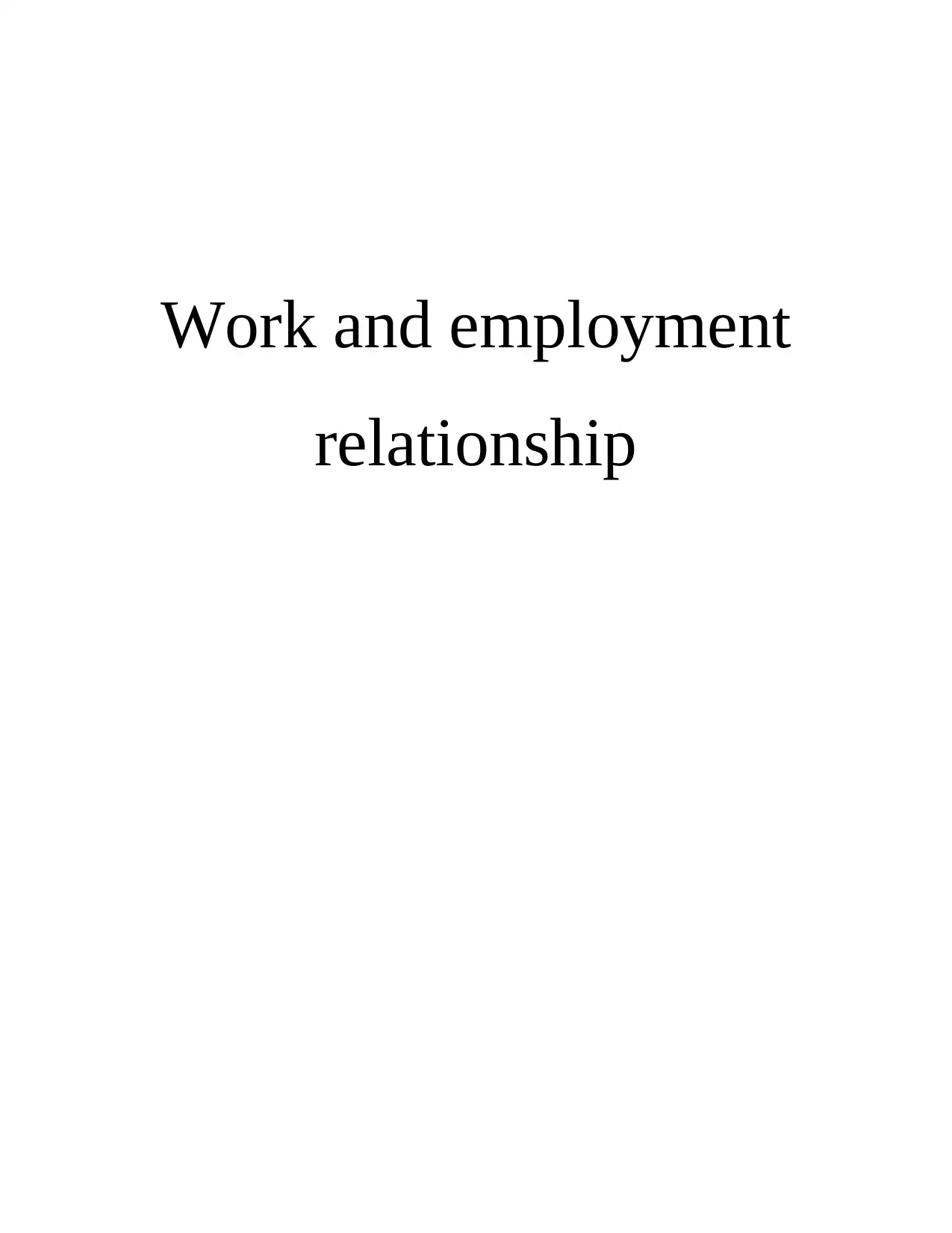
Work and employment
relationship
relationship
Paraphrase This Document
Need a fresh take? Get an instant paraphrase of this document with our AI Paraphraser
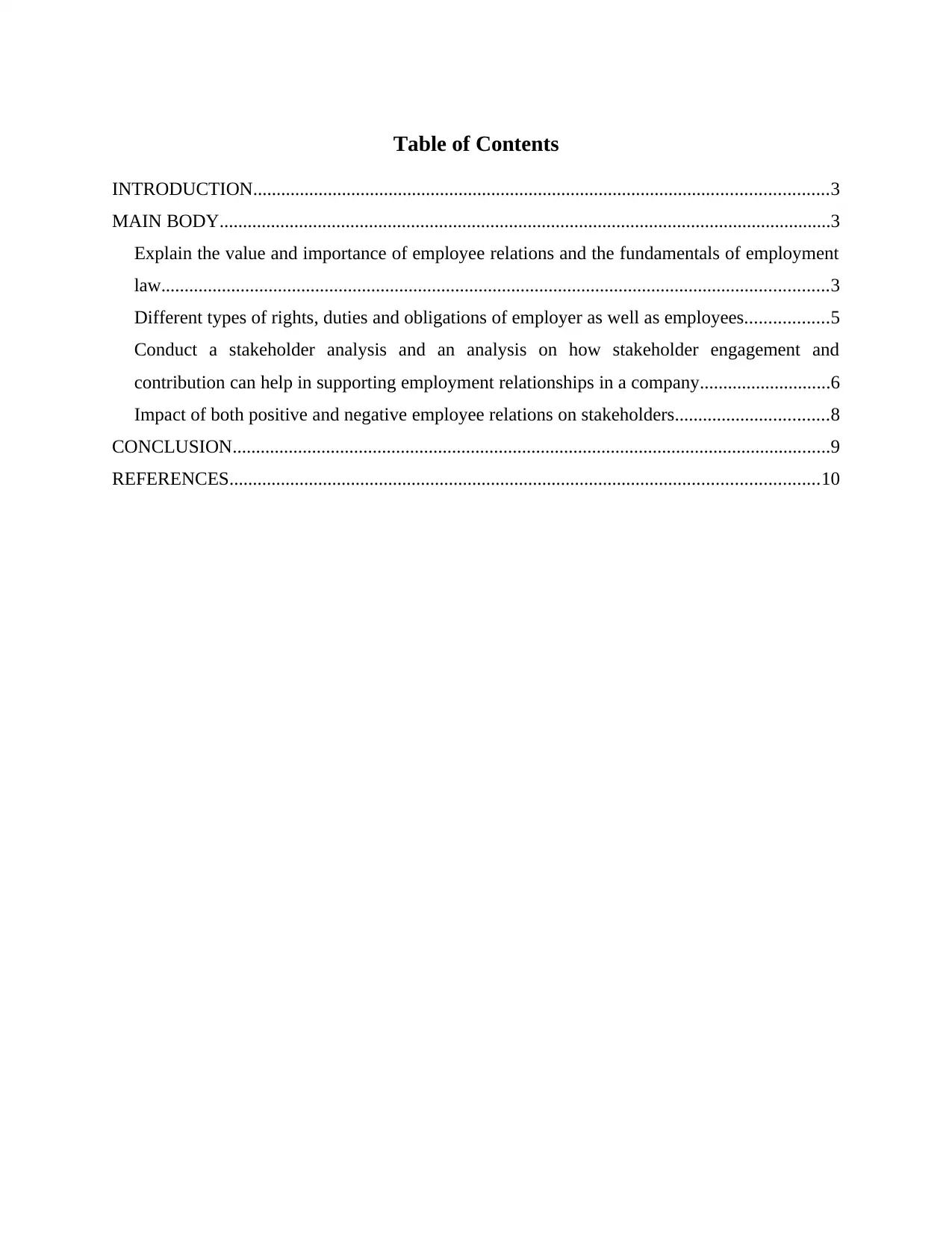
Table of Contents
INTRODUCTION...........................................................................................................................3
MAIN BODY...................................................................................................................................3
Explain the value and importance of employee relations and the fundamentals of employment
law...............................................................................................................................................3
Different types of rights, duties and obligations of employer as well as employees..................5
Conduct a stakeholder analysis and an analysis on how stakeholder engagement and
contribution can help in supporting employment relationships in a company............................6
Impact of both positive and negative employee relations on stakeholders.................................8
CONCLUSION................................................................................................................................9
REFERENCES..............................................................................................................................10
INTRODUCTION...........................................................................................................................3
MAIN BODY...................................................................................................................................3
Explain the value and importance of employee relations and the fundamentals of employment
law...............................................................................................................................................3
Different types of rights, duties and obligations of employer as well as employees..................5
Conduct a stakeholder analysis and an analysis on how stakeholder engagement and
contribution can help in supporting employment relationships in a company............................6
Impact of both positive and negative employee relations on stakeholders.................................8
CONCLUSION................................................................................................................................9
REFERENCES..............................................................................................................................10
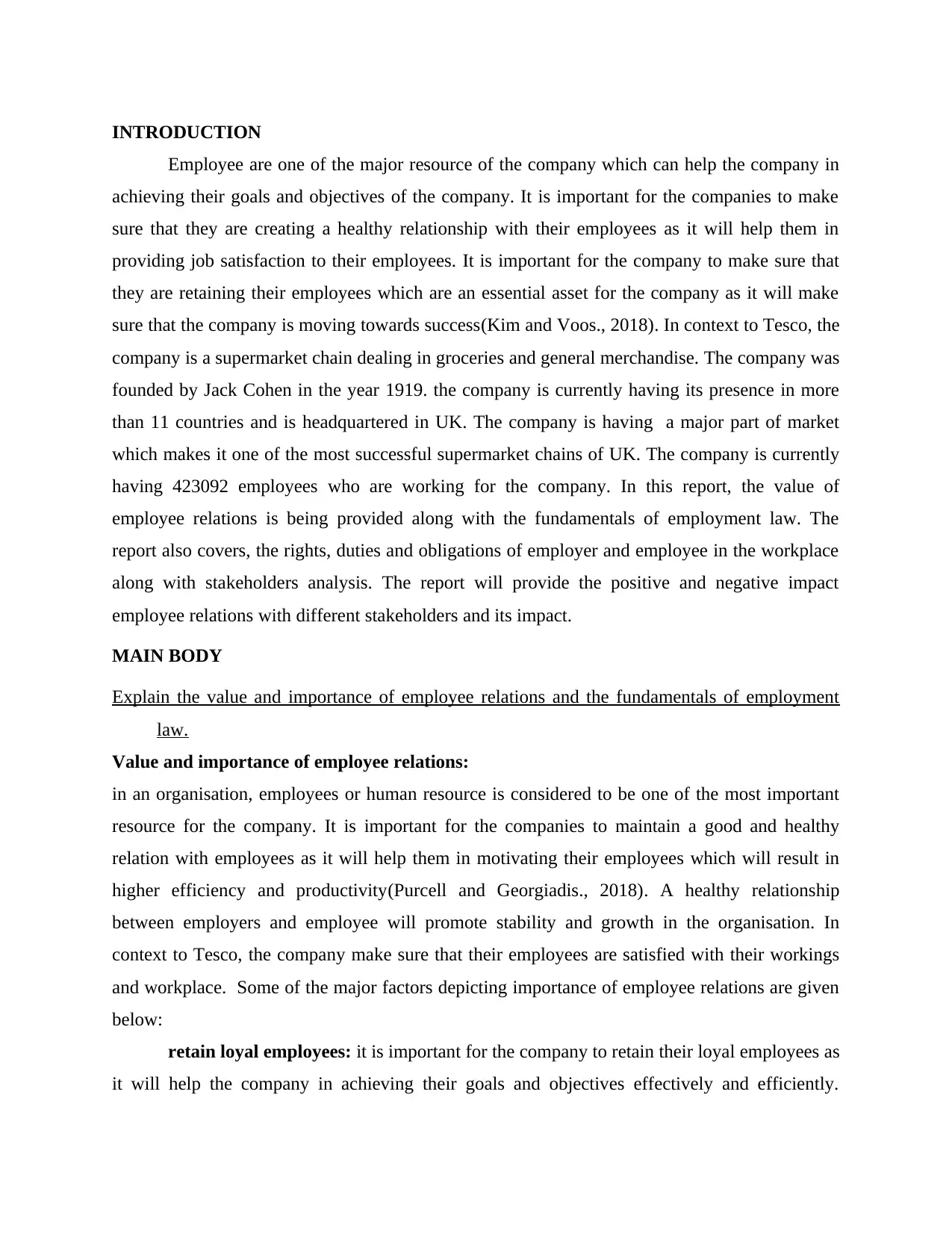
INTRODUCTION
Employee are one of the major resource of the company which can help the company in
achieving their goals and objectives of the company. It is important for the companies to make
sure that they are creating a healthy relationship with their employees as it will help them in
providing job satisfaction to their employees. It is important for the company to make sure that
they are retaining their employees which are an essential asset for the company as it will make
sure that the company is moving towards success(Kim and Voos., 2018). In context to Tesco, the
company is a supermarket chain dealing in groceries and general merchandise. The company was
founded by Jack Cohen in the year 1919. the company is currently having its presence in more
than 11 countries and is headquartered in UK. The company is having a major part of market
which makes it one of the most successful supermarket chains of UK. The company is currently
having 423092 employees who are working for the company. In this report, the value of
employee relations is being provided along with the fundamentals of employment law. The
report also covers, the rights, duties and obligations of employer and employee in the workplace
along with stakeholders analysis. The report will provide the positive and negative impact
employee relations with different stakeholders and its impact.
MAIN BODY
Explain the value and importance of employee relations and the fundamentals of employment
law.
Value and importance of employee relations:
in an organisation, employees or human resource is considered to be one of the most important
resource for the company. It is important for the companies to maintain a good and healthy
relation with employees as it will help them in motivating their employees which will result in
higher efficiency and productivity(Purcell and Georgiadis., 2018). A healthy relationship
between employers and employee will promote stability and growth in the organisation. In
context to Tesco, the company make sure that their employees are satisfied with their workings
and workplace. Some of the major factors depicting importance of employee relations are given
below:
retain loyal employees: it is important for the company to retain their loyal employees as
it will help the company in achieving their goals and objectives effectively and efficiently.
Employee are one of the major resource of the company which can help the company in
achieving their goals and objectives of the company. It is important for the companies to make
sure that they are creating a healthy relationship with their employees as it will help them in
providing job satisfaction to their employees. It is important for the company to make sure that
they are retaining their employees which are an essential asset for the company as it will make
sure that the company is moving towards success(Kim and Voos., 2018). In context to Tesco, the
company is a supermarket chain dealing in groceries and general merchandise. The company was
founded by Jack Cohen in the year 1919. the company is currently having its presence in more
than 11 countries and is headquartered in UK. The company is having a major part of market
which makes it one of the most successful supermarket chains of UK. The company is currently
having 423092 employees who are working for the company. In this report, the value of
employee relations is being provided along with the fundamentals of employment law. The
report also covers, the rights, duties and obligations of employer and employee in the workplace
along with stakeholders analysis. The report will provide the positive and negative impact
employee relations with different stakeholders and its impact.
MAIN BODY
Explain the value and importance of employee relations and the fundamentals of employment
law.
Value and importance of employee relations:
in an organisation, employees or human resource is considered to be one of the most important
resource for the company. It is important for the companies to maintain a good and healthy
relation with employees as it will help them in motivating their employees which will result in
higher efficiency and productivity(Purcell and Georgiadis., 2018). A healthy relationship
between employers and employee will promote stability and growth in the organisation. In
context to Tesco, the company make sure that their employees are satisfied with their workings
and workplace. Some of the major factors depicting importance of employee relations are given
below:
retain loyal employees: it is important for the company to retain their loyal employees as
it will help the company in achieving their goals and objectives effectively and efficiently.
⊘ This is a preview!⊘
Do you want full access?
Subscribe today to unlock all pages.

Trusted by 1+ million students worldwide
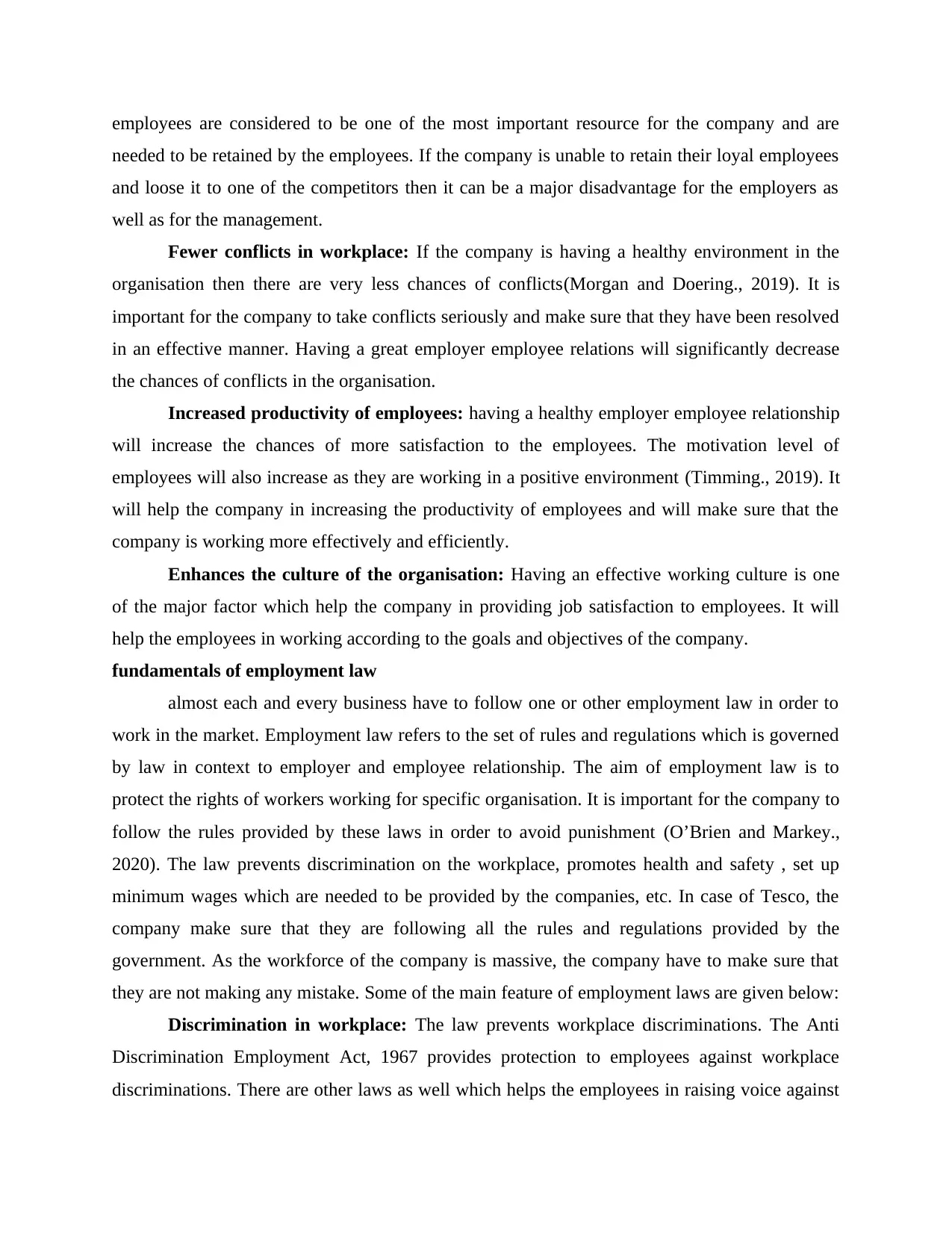
employees are considered to be one of the most important resource for the company and are
needed to be retained by the employees. If the company is unable to retain their loyal employees
and loose it to one of the competitors then it can be a major disadvantage for the employers as
well as for the management.
Fewer conflicts in workplace: If the company is having a healthy environment in the
organisation then there are very less chances of conflicts(Morgan and Doering., 2019). It is
important for the company to take conflicts seriously and make sure that they have been resolved
in an effective manner. Having a great employer employee relations will significantly decrease
the chances of conflicts in the organisation.
Increased productivity of employees: having a healthy employer employee relationship
will increase the chances of more satisfaction to the employees. The motivation level of
employees will also increase as they are working in a positive environment (Timming., 2019). It
will help the company in increasing the productivity of employees and will make sure that the
company is working more effectively and efficiently.
Enhances the culture of the organisation: Having an effective working culture is one
of the major factor which help the company in providing job satisfaction to employees. It will
help the employees in working according to the goals and objectives of the company.
fundamentals of employment law
almost each and every business have to follow one or other employment law in order to
work in the market. Employment law refers to the set of rules and regulations which is governed
by law in context to employer and employee relationship. The aim of employment law is to
protect the rights of workers working for specific organisation. It is important for the company to
follow the rules provided by these laws in order to avoid punishment (O’Brien and Markey.,
2020). The law prevents discrimination on the workplace, promotes health and safety , set up
minimum wages which are needed to be provided by the companies, etc. In case of Tesco, the
company make sure that they are following all the rules and regulations provided by the
government. As the workforce of the company is massive, the company have to make sure that
they are not making any mistake. Some of the main feature of employment laws are given below:
Discrimination in workplace: The law prevents workplace discriminations. The Anti
Discrimination Employment Act, 1967 provides protection to employees against workplace
discriminations. There are other laws as well which helps the employees in raising voice against
needed to be retained by the employees. If the company is unable to retain their loyal employees
and loose it to one of the competitors then it can be a major disadvantage for the employers as
well as for the management.
Fewer conflicts in workplace: If the company is having a healthy environment in the
organisation then there are very less chances of conflicts(Morgan and Doering., 2019). It is
important for the company to take conflicts seriously and make sure that they have been resolved
in an effective manner. Having a great employer employee relations will significantly decrease
the chances of conflicts in the organisation.
Increased productivity of employees: having a healthy employer employee relationship
will increase the chances of more satisfaction to the employees. The motivation level of
employees will also increase as they are working in a positive environment (Timming., 2019). It
will help the company in increasing the productivity of employees and will make sure that the
company is working more effectively and efficiently.
Enhances the culture of the organisation: Having an effective working culture is one
of the major factor which help the company in providing job satisfaction to employees. It will
help the employees in working according to the goals and objectives of the company.
fundamentals of employment law
almost each and every business have to follow one or other employment law in order to
work in the market. Employment law refers to the set of rules and regulations which is governed
by law in context to employer and employee relationship. The aim of employment law is to
protect the rights of workers working for specific organisation. It is important for the company to
follow the rules provided by these laws in order to avoid punishment (O’Brien and Markey.,
2020). The law prevents discrimination on the workplace, promotes health and safety , set up
minimum wages which are needed to be provided by the companies, etc. In case of Tesco, the
company make sure that they are following all the rules and regulations provided by the
government. As the workforce of the company is massive, the company have to make sure that
they are not making any mistake. Some of the main feature of employment laws are given below:
Discrimination in workplace: The law prevents workplace discriminations. The Anti
Discrimination Employment Act, 1967 provides protection to employees against workplace
discriminations. There are other laws as well which helps the employees in raising voice against
Paraphrase This Document
Need a fresh take? Get an instant paraphrase of this document with our AI Paraphraser
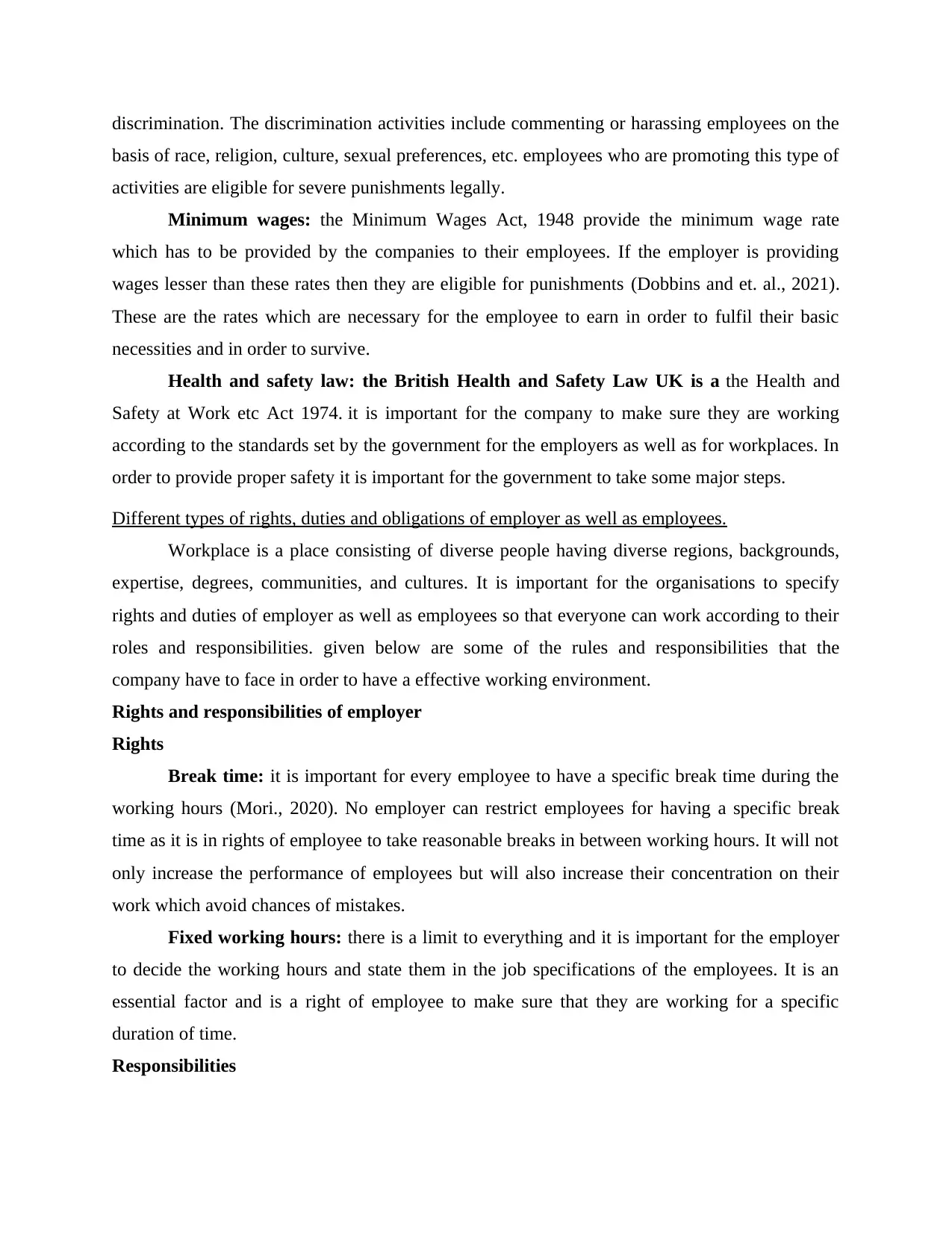
discrimination. The discrimination activities include commenting or harassing employees on the
basis of race, religion, culture, sexual preferences, etc. employees who are promoting this type of
activities are eligible for severe punishments legally.
Minimum wages: the Minimum Wages Act, 1948 provide the minimum wage rate
which has to be provided by the companies to their employees. If the employer is providing
wages lesser than these rates then they are eligible for punishments (Dobbins and et. al., 2021).
These are the rates which are necessary for the employee to earn in order to fulfil their basic
necessities and in order to survive.
Health and safety law: the British Health and Safety Law UK is a the Health and
Safety at Work etc Act 1974. it is important for the company to make sure they are working
according to the standards set by the government for the employers as well as for workplaces. In
order to provide proper safety it is important for the government to take some major steps.
Different types of rights, duties and obligations of employer as well as employees.
Workplace is a place consisting of diverse people having diverse regions, backgrounds,
expertise, degrees, communities, and cultures. It is important for the organisations to specify
rights and duties of employer as well as employees so that everyone can work according to their
roles and responsibilities. given below are some of the rules and responsibilities that the
company have to face in order to have a effective working environment.
Rights and responsibilities of employer
Rights
Break time: it is important for every employee to have a specific break time during the
working hours (Mori., 2020). No employer can restrict employees for having a specific break
time as it is in rights of employee to take reasonable breaks in between working hours. It will not
only increase the performance of employees but will also increase their concentration on their
work which avoid chances of mistakes.
Fixed working hours: there is a limit to everything and it is important for the employer
to decide the working hours and state them in the job specifications of the employees. It is an
essential factor and is a right of employee to make sure that they are working for a specific
duration of time.
Responsibilities
basis of race, religion, culture, sexual preferences, etc. employees who are promoting this type of
activities are eligible for severe punishments legally.
Minimum wages: the Minimum Wages Act, 1948 provide the minimum wage rate
which has to be provided by the companies to their employees. If the employer is providing
wages lesser than these rates then they are eligible for punishments (Dobbins and et. al., 2021).
These are the rates which are necessary for the employee to earn in order to fulfil their basic
necessities and in order to survive.
Health and safety law: the British Health and Safety Law UK is a the Health and
Safety at Work etc Act 1974. it is important for the company to make sure they are working
according to the standards set by the government for the employers as well as for workplaces. In
order to provide proper safety it is important for the government to take some major steps.
Different types of rights, duties and obligations of employer as well as employees.
Workplace is a place consisting of diverse people having diverse regions, backgrounds,
expertise, degrees, communities, and cultures. It is important for the organisations to specify
rights and duties of employer as well as employees so that everyone can work according to their
roles and responsibilities. given below are some of the rules and responsibilities that the
company have to face in order to have a effective working environment.
Rights and responsibilities of employer
Rights
Break time: it is important for every employee to have a specific break time during the
working hours (Mori., 2020). No employer can restrict employees for having a specific break
time as it is in rights of employee to take reasonable breaks in between working hours. It will not
only increase the performance of employees but will also increase their concentration on their
work which avoid chances of mistakes.
Fixed working hours: there is a limit to everything and it is important for the employer
to decide the working hours and state them in the job specifications of the employees. It is an
essential factor and is a right of employee to make sure that they are working for a specific
duration of time.
Responsibilities
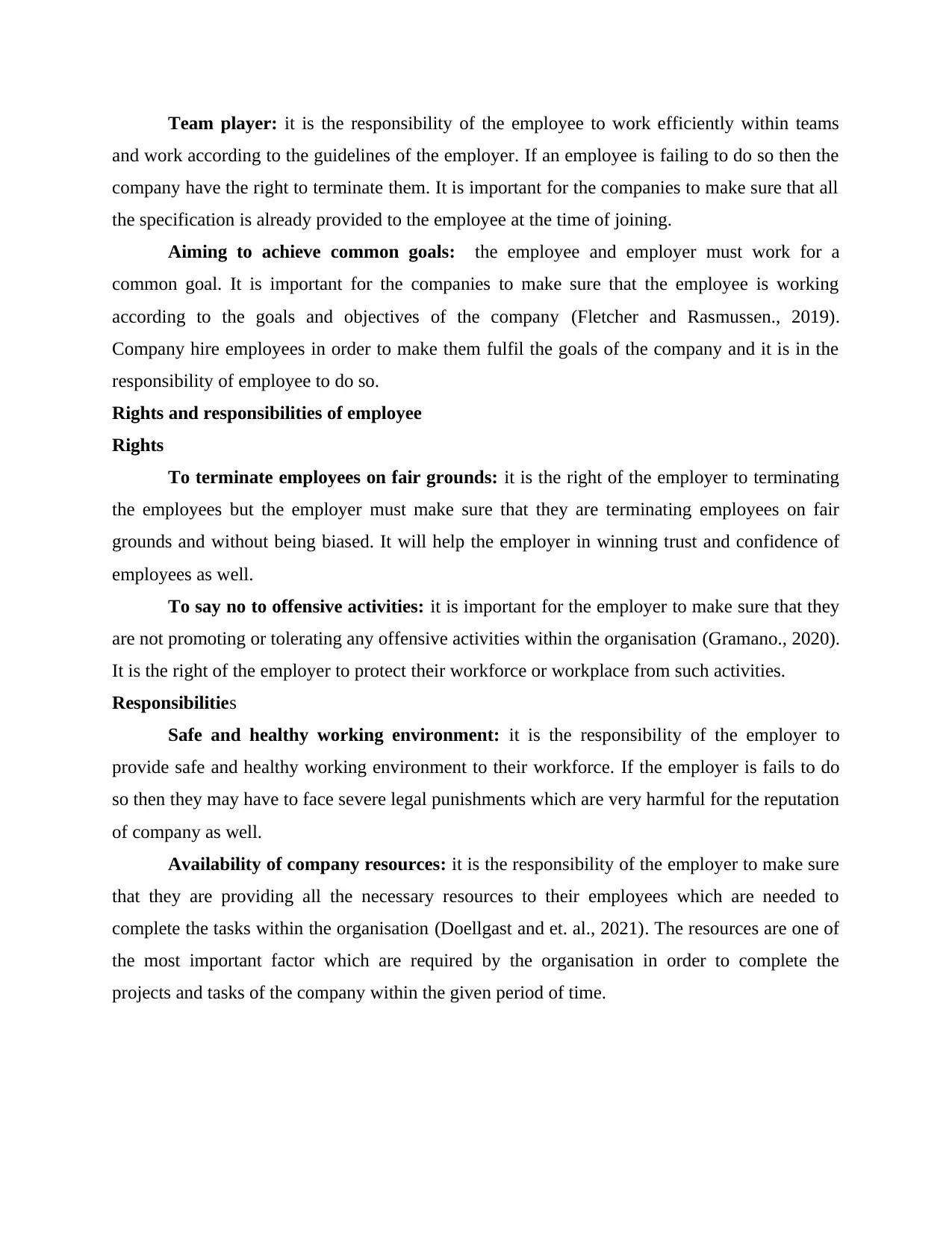
Team player: it is the responsibility of the employee to work efficiently within teams
and work according to the guidelines of the employer. If an employee is failing to do so then the
company have the right to terminate them. It is important for the companies to make sure that all
the specification is already provided to the employee at the time of joining.
Aiming to achieve common goals: the employee and employer must work for a
common goal. It is important for the companies to make sure that the employee is working
according to the goals and objectives of the company (Fletcher and Rasmussen., 2019).
Company hire employees in order to make them fulfil the goals of the company and it is in the
responsibility of employee to do so.
Rights and responsibilities of employee
Rights
To terminate employees on fair grounds: it is the right of the employer to terminating
the employees but the employer must make sure that they are terminating employees on fair
grounds and without being biased. It will help the employer in winning trust and confidence of
employees as well.
To say no to offensive activities: it is important for the employer to make sure that they
are not promoting or tolerating any offensive activities within the organisation (Gramano., 2020).
It is the right of the employer to protect their workforce or workplace from such activities.
Responsibilities
Safe and healthy working environment: it is the responsibility of the employer to
provide safe and healthy working environment to their workforce. If the employer is fails to do
so then they may have to face severe legal punishments which are very harmful for the reputation
of company as well.
Availability of company resources: it is the responsibility of the employer to make sure
that they are providing all the necessary resources to their employees which are needed to
complete the tasks within the organisation (Doellgast and et. al., 2021). The resources are one of
the most important factor which are required by the organisation in order to complete the
projects and tasks of the company within the given period of time.
and work according to the guidelines of the employer. If an employee is failing to do so then the
company have the right to terminate them. It is important for the companies to make sure that all
the specification is already provided to the employee at the time of joining.
Aiming to achieve common goals: the employee and employer must work for a
common goal. It is important for the companies to make sure that the employee is working
according to the goals and objectives of the company (Fletcher and Rasmussen., 2019).
Company hire employees in order to make them fulfil the goals of the company and it is in the
responsibility of employee to do so.
Rights and responsibilities of employee
Rights
To terminate employees on fair grounds: it is the right of the employer to terminating
the employees but the employer must make sure that they are terminating employees on fair
grounds and without being biased. It will help the employer in winning trust and confidence of
employees as well.
To say no to offensive activities: it is important for the employer to make sure that they
are not promoting or tolerating any offensive activities within the organisation (Gramano., 2020).
It is the right of the employer to protect their workforce or workplace from such activities.
Responsibilities
Safe and healthy working environment: it is the responsibility of the employer to
provide safe and healthy working environment to their workforce. If the employer is fails to do
so then they may have to face severe legal punishments which are very harmful for the reputation
of company as well.
Availability of company resources: it is the responsibility of the employer to make sure
that they are providing all the necessary resources to their employees which are needed to
complete the tasks within the organisation (Doellgast and et. al., 2021). The resources are one of
the most important factor which are required by the organisation in order to complete the
projects and tasks of the company within the given period of time.
⊘ This is a preview!⊘
Do you want full access?
Subscribe today to unlock all pages.

Trusted by 1+ million students worldwide
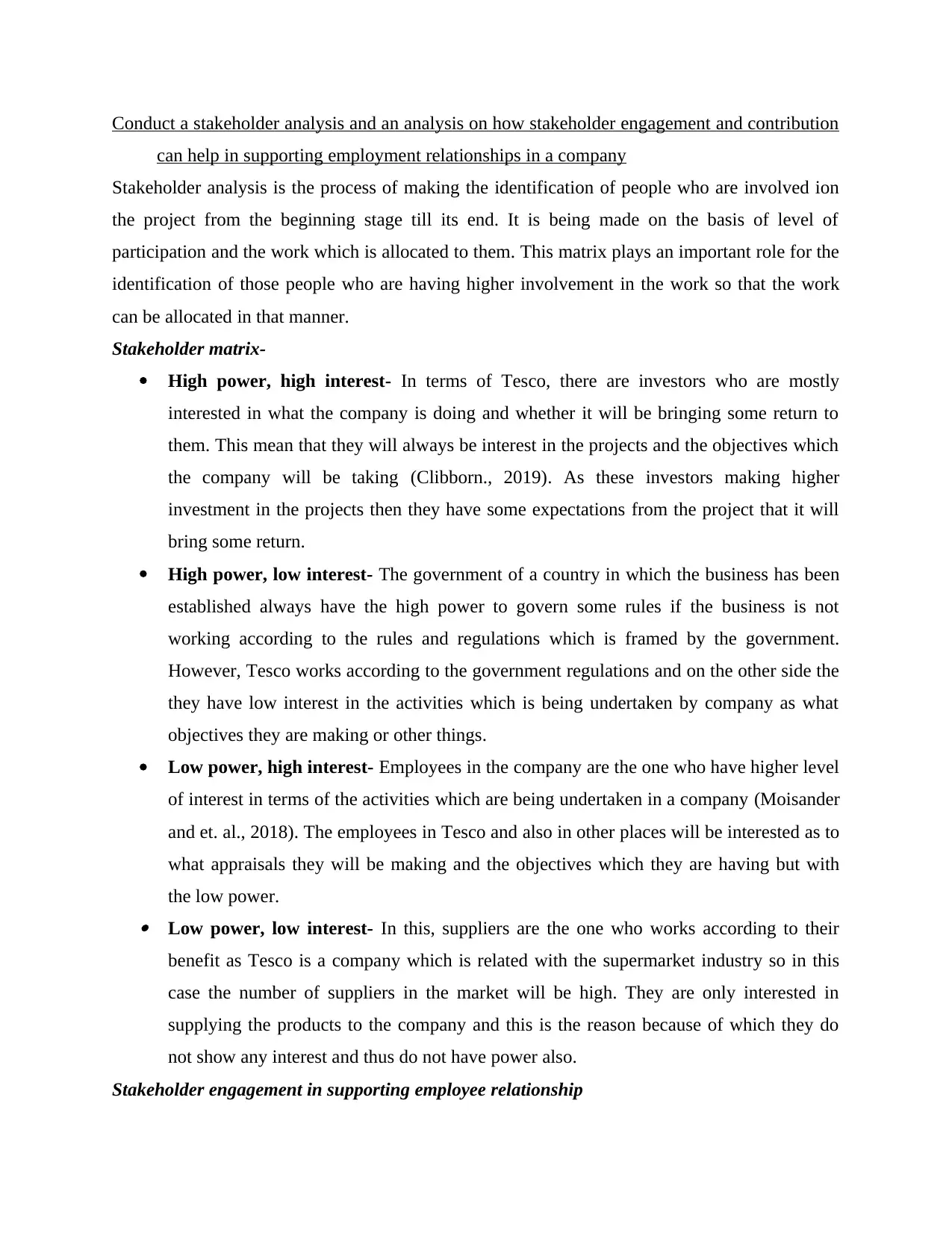
Conduct a stakeholder analysis and an analysis on how stakeholder engagement and contribution
can help in supporting employment relationships in a company
Stakeholder analysis is the process of making the identification of people who are involved ion
the project from the beginning stage till its end. It is being made on the basis of level of
participation and the work which is allocated to them. This matrix plays an important role for the
identification of those people who are having higher involvement in the work so that the work
can be allocated in that manner.
Stakeholder matrix-
High power, high interest- In terms of Tesco, there are investors who are mostly
interested in what the company is doing and whether it will be bringing some return to
them. This mean that they will always be interest in the projects and the objectives which
the company will be taking (Clibborn., 2019). As these investors making higher
investment in the projects then they have some expectations from the project that it will
bring some return.
High power, low interest- The government of a country in which the business has been
established always have the high power to govern some rules if the business is not
working according to the rules and regulations which is framed by the government.
However, Tesco works according to the government regulations and on the other side the
they have low interest in the activities which is being undertaken by company as what
objectives they are making or other things.
Low power, high interest- Employees in the company are the one who have higher level
of interest in terms of the activities which are being undertaken in a company (Moisander
and et. al., 2018). The employees in Tesco and also in other places will be interested as to
what appraisals they will be making and the objectives which they are having but with
the low power. Low power, low interest- In this, suppliers are the one who works according to their
benefit as Tesco is a company which is related with the supermarket industry so in this
case the number of suppliers in the market will be high. They are only interested in
supplying the products to the company and this is the reason because of which they do
not show any interest and thus do not have power also.
Stakeholder engagement in supporting employee relationship
can help in supporting employment relationships in a company
Stakeholder analysis is the process of making the identification of people who are involved ion
the project from the beginning stage till its end. It is being made on the basis of level of
participation and the work which is allocated to them. This matrix plays an important role for the
identification of those people who are having higher involvement in the work so that the work
can be allocated in that manner.
Stakeholder matrix-
High power, high interest- In terms of Tesco, there are investors who are mostly
interested in what the company is doing and whether it will be bringing some return to
them. This mean that they will always be interest in the projects and the objectives which
the company will be taking (Clibborn., 2019). As these investors making higher
investment in the projects then they have some expectations from the project that it will
bring some return.
High power, low interest- The government of a country in which the business has been
established always have the high power to govern some rules if the business is not
working according to the rules and regulations which is framed by the government.
However, Tesco works according to the government regulations and on the other side the
they have low interest in the activities which is being undertaken by company as what
objectives they are making or other things.
Low power, high interest- Employees in the company are the one who have higher level
of interest in terms of the activities which are being undertaken in a company (Moisander
and et. al., 2018). The employees in Tesco and also in other places will be interested as to
what appraisals they will be making and the objectives which they are having but with
the low power. Low power, low interest- In this, suppliers are the one who works according to their
benefit as Tesco is a company which is related with the supermarket industry so in this
case the number of suppliers in the market will be high. They are only interested in
supplying the products to the company and this is the reason because of which they do
not show any interest and thus do not have power also.
Stakeholder engagement in supporting employee relationship
Paraphrase This Document
Need a fresh take? Get an instant paraphrase of this document with our AI Paraphraser
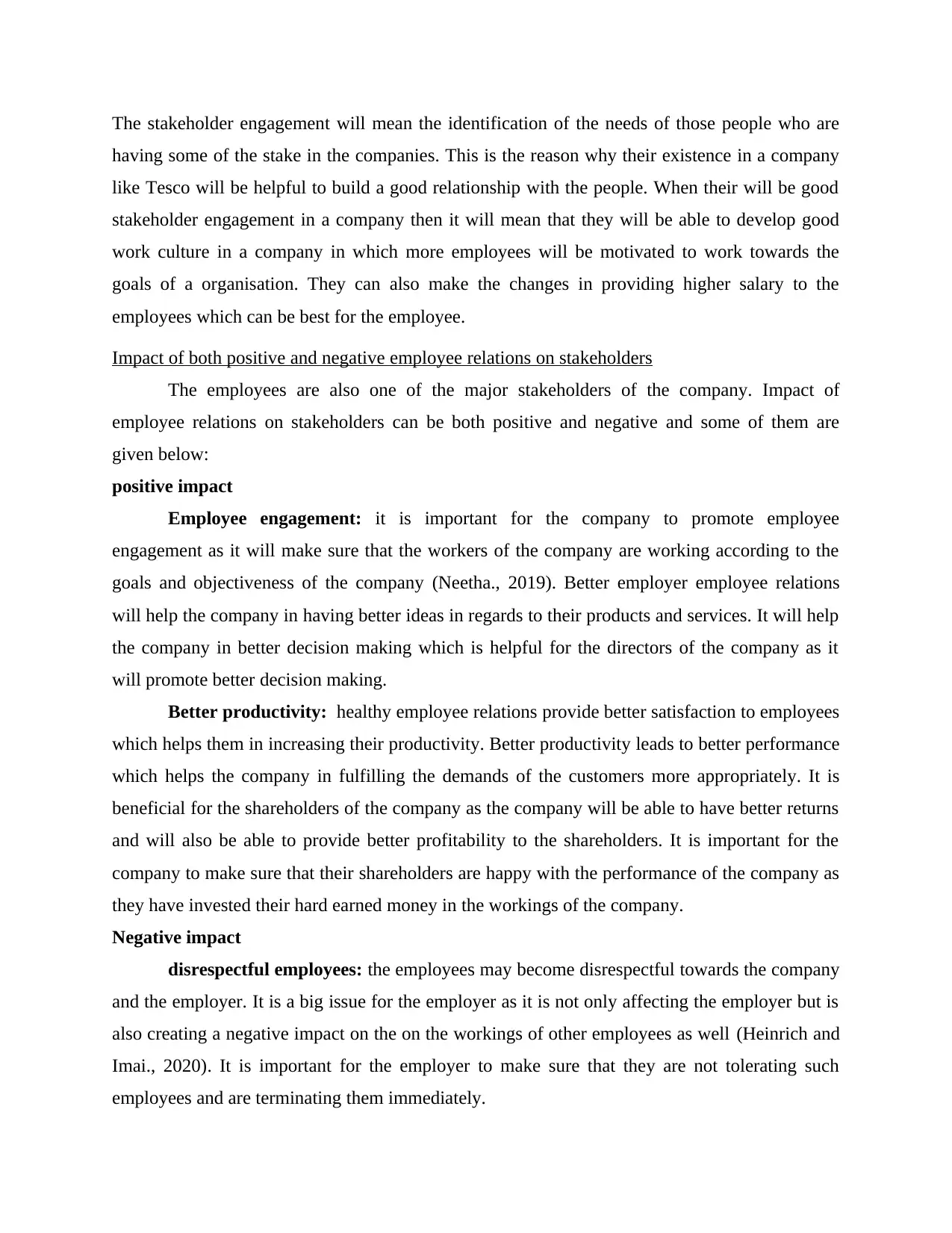
The stakeholder engagement will mean the identification of the needs of those people who are
having some of the stake in the companies. This is the reason why their existence in a company
like Tesco will be helpful to build a good relationship with the people. When their will be good
stakeholder engagement in a company then it will mean that they will be able to develop good
work culture in a company in which more employees will be motivated to work towards the
goals of a organisation. They can also make the changes in providing higher salary to the
employees which can be best for the employee.
Impact of both positive and negative employee relations on stakeholders
The employees are also one of the major stakeholders of the company. Impact of
employee relations on stakeholders can be both positive and negative and some of them are
given below:
positive impact
Employee engagement: it is important for the company to promote employee
engagement as it will make sure that the workers of the company are working according to the
goals and objectiveness of the company (Neetha., 2019). Better employer employee relations
will help the company in having better ideas in regards to their products and services. It will help
the company in better decision making which is helpful for the directors of the company as it
will promote better decision making.
Better productivity: healthy employee relations provide better satisfaction to employees
which helps them in increasing their productivity. Better productivity leads to better performance
which helps the company in fulfilling the demands of the customers more appropriately. It is
beneficial for the shareholders of the company as the company will be able to have better returns
and will also be able to provide better profitability to the shareholders. It is important for the
company to make sure that their shareholders are happy with the performance of the company as
they have invested their hard earned money in the workings of the company.
Negative impact
disrespectful employees: the employees may become disrespectful towards the company
and the employer. It is a big issue for the employer as it is not only affecting the employer but is
also creating a negative impact on the on the workings of other employees as well (Heinrich and
Imai., 2020). It is important for the employer to make sure that they are not tolerating such
employees and are terminating them immediately.
having some of the stake in the companies. This is the reason why their existence in a company
like Tesco will be helpful to build a good relationship with the people. When their will be good
stakeholder engagement in a company then it will mean that they will be able to develop good
work culture in a company in which more employees will be motivated to work towards the
goals of a organisation. They can also make the changes in providing higher salary to the
employees which can be best for the employee.
Impact of both positive and negative employee relations on stakeholders
The employees are also one of the major stakeholders of the company. Impact of
employee relations on stakeholders can be both positive and negative and some of them are
given below:
positive impact
Employee engagement: it is important for the company to promote employee
engagement as it will make sure that the workers of the company are working according to the
goals and objectiveness of the company (Neetha., 2019). Better employer employee relations
will help the company in having better ideas in regards to their products and services. It will help
the company in better decision making which is helpful for the directors of the company as it
will promote better decision making.
Better productivity: healthy employee relations provide better satisfaction to employees
which helps them in increasing their productivity. Better productivity leads to better performance
which helps the company in fulfilling the demands of the customers more appropriately. It is
beneficial for the shareholders of the company as the company will be able to have better returns
and will also be able to provide better profitability to the shareholders. It is important for the
company to make sure that their shareholders are happy with the performance of the company as
they have invested their hard earned money in the workings of the company.
Negative impact
disrespectful employees: the employees may become disrespectful towards the company
and the employer. It is a big issue for the employer as it is not only affecting the employer but is
also creating a negative impact on the on the workings of other employees as well (Heinrich and
Imai., 2020). It is important for the employer to make sure that they are not tolerating such
employees and are terminating them immediately.
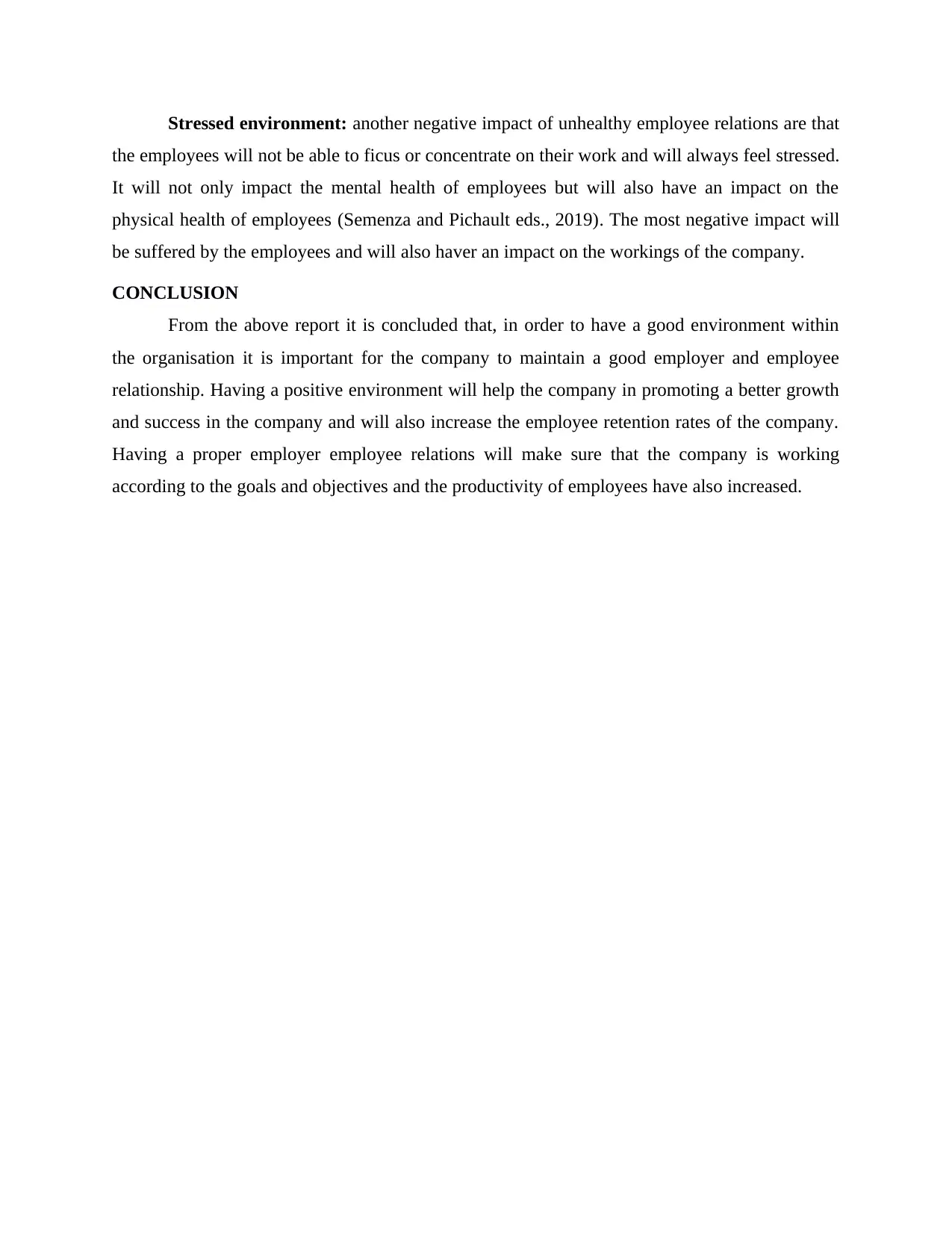
Stressed environment: another negative impact of unhealthy employee relations are that
the employees will not be able to ficus or concentrate on their work and will always feel stressed.
It will not only impact the mental health of employees but will also have an impact on the
physical health of employees (Semenza and Pichault eds., 2019). The most negative impact will
be suffered by the employees and will also haver an impact on the workings of the company.
CONCLUSION
From the above report it is concluded that, in order to have a good environment within
the organisation it is important for the company to maintain a good employer and employee
relationship. Having a positive environment will help the company in promoting a better growth
and success in the company and will also increase the employee retention rates of the company.
Having a proper employer employee relations will make sure that the company is working
according to the goals and objectives and the productivity of employees have also increased.
the employees will not be able to ficus or concentrate on their work and will always feel stressed.
It will not only impact the mental health of employees but will also have an impact on the
physical health of employees (Semenza and Pichault eds., 2019). The most negative impact will
be suffered by the employees and will also haver an impact on the workings of the company.
CONCLUSION
From the above report it is concluded that, in order to have a good environment within
the organisation it is important for the company to maintain a good employer and employee
relationship. Having a positive environment will help the company in promoting a better growth
and success in the company and will also increase the employee retention rates of the company.
Having a proper employer employee relations will make sure that the company is working
according to the goals and objectives and the productivity of employees have also increased.
⊘ This is a preview!⊘
Do you want full access?
Subscribe today to unlock all pages.

Trusted by 1+ million students worldwide
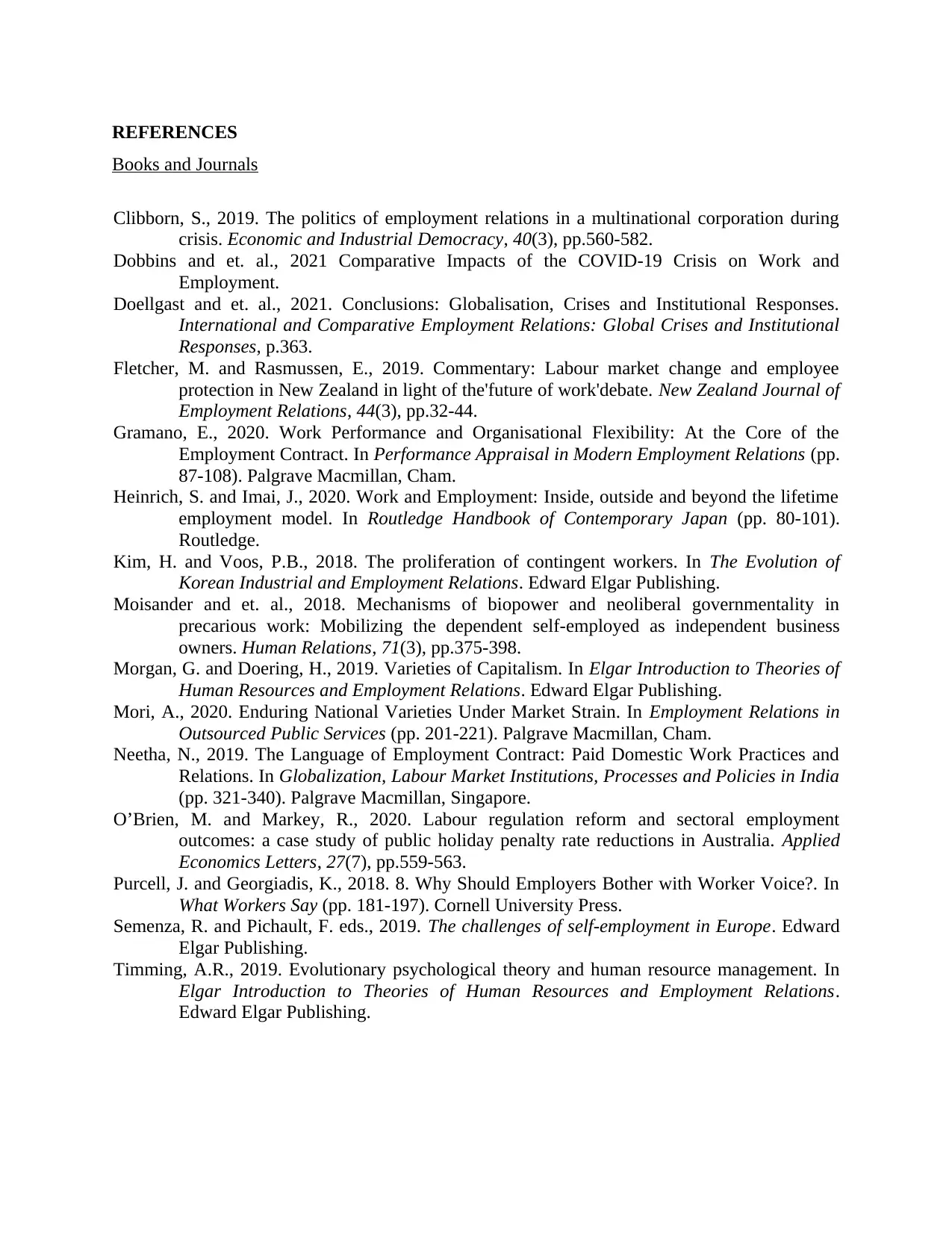
REFERENCES
Books and Journals
Clibborn, S., 2019. The politics of employment relations in a multinational corporation during
crisis. Economic and Industrial Democracy, 40(3), pp.560-582.
Dobbins and et. al., 2021 Comparative Impacts of the COVID-19 Crisis on Work and
Employment.
Doellgast and et. al., 2021. Conclusions: Globalisation, Crises and Institutional Responses.
International and Comparative Employment Relations: Global Crises and Institutional
Responses, p.363.
Fletcher, M. and Rasmussen, E., 2019. Commentary: Labour market change and employee
protection in New Zealand in light of the'future of work'debate. New Zealand Journal of
Employment Relations, 44(3), pp.32-44.
Gramano, E., 2020. Work Performance and Organisational Flexibility: At the Core of the
Employment Contract. In Performance Appraisal in Modern Employment Relations (pp.
87-108). Palgrave Macmillan, Cham.
Heinrich, S. and Imai, J., 2020. Work and Employment: Inside, outside and beyond the lifetime
employment model. In Routledge Handbook of Contemporary Japan (pp. 80-101).
Routledge.
Kim, H. and Voos, P.B., 2018. The proliferation of contingent workers. In The Evolution of
Korean Industrial and Employment Relations. Edward Elgar Publishing.
Moisander and et. al., 2018. Mechanisms of biopower and neoliberal governmentality in
precarious work: Mobilizing the dependent self-employed as independent business
owners. Human Relations, 71(3), pp.375-398.
Morgan, G. and Doering, H., 2019. Varieties of Capitalism. In Elgar Introduction to Theories of
Human Resources and Employment Relations. Edward Elgar Publishing.
Mori, A., 2020. Enduring National Varieties Under Market Strain. In Employment Relations in
Outsourced Public Services (pp. 201-221). Palgrave Macmillan, Cham.
Neetha, N., 2019. The Language of Employment Contract: Paid Domestic Work Practices and
Relations. In Globalization, Labour Market Institutions, Processes and Policies in India
(pp. 321-340). Palgrave Macmillan, Singapore.
O’Brien, M. and Markey, R., 2020. Labour regulation reform and sectoral employment
outcomes: a case study of public holiday penalty rate reductions in Australia. Applied
Economics Letters, 27(7), pp.559-563.
Purcell, J. and Georgiadis, K., 2018. 8. Why Should Employers Bother with Worker Voice?. In
What Workers Say (pp. 181-197). Cornell University Press.
Semenza, R. and Pichault, F. eds., 2019. The challenges of self-employment in Europe. Edward
Elgar Publishing.
Timming, A.R., 2019. Evolutionary psychological theory and human resource management. In
Elgar Introduction to Theories of Human Resources and Employment Relations.
Edward Elgar Publishing.
Books and Journals
Clibborn, S., 2019. The politics of employment relations in a multinational corporation during
crisis. Economic and Industrial Democracy, 40(3), pp.560-582.
Dobbins and et. al., 2021 Comparative Impacts of the COVID-19 Crisis on Work and
Employment.
Doellgast and et. al., 2021. Conclusions: Globalisation, Crises and Institutional Responses.
International and Comparative Employment Relations: Global Crises and Institutional
Responses, p.363.
Fletcher, M. and Rasmussen, E., 2019. Commentary: Labour market change and employee
protection in New Zealand in light of the'future of work'debate. New Zealand Journal of
Employment Relations, 44(3), pp.32-44.
Gramano, E., 2020. Work Performance and Organisational Flexibility: At the Core of the
Employment Contract. In Performance Appraisal in Modern Employment Relations (pp.
87-108). Palgrave Macmillan, Cham.
Heinrich, S. and Imai, J., 2020. Work and Employment: Inside, outside and beyond the lifetime
employment model. In Routledge Handbook of Contemporary Japan (pp. 80-101).
Routledge.
Kim, H. and Voos, P.B., 2018. The proliferation of contingent workers. In The Evolution of
Korean Industrial and Employment Relations. Edward Elgar Publishing.
Moisander and et. al., 2018. Mechanisms of biopower and neoliberal governmentality in
precarious work: Mobilizing the dependent self-employed as independent business
owners. Human Relations, 71(3), pp.375-398.
Morgan, G. and Doering, H., 2019. Varieties of Capitalism. In Elgar Introduction to Theories of
Human Resources and Employment Relations. Edward Elgar Publishing.
Mori, A., 2020. Enduring National Varieties Under Market Strain. In Employment Relations in
Outsourced Public Services (pp. 201-221). Palgrave Macmillan, Cham.
Neetha, N., 2019. The Language of Employment Contract: Paid Domestic Work Practices and
Relations. In Globalization, Labour Market Institutions, Processes and Policies in India
(pp. 321-340). Palgrave Macmillan, Singapore.
O’Brien, M. and Markey, R., 2020. Labour regulation reform and sectoral employment
outcomes: a case study of public holiday penalty rate reductions in Australia. Applied
Economics Letters, 27(7), pp.559-563.
Purcell, J. and Georgiadis, K., 2018. 8. Why Should Employers Bother with Worker Voice?. In
What Workers Say (pp. 181-197). Cornell University Press.
Semenza, R. and Pichault, F. eds., 2019. The challenges of self-employment in Europe. Edward
Elgar Publishing.
Timming, A.R., 2019. Evolutionary psychological theory and human resource management. In
Elgar Introduction to Theories of Human Resources and Employment Relations.
Edward Elgar Publishing.
1 out of 10
Related Documents
Your All-in-One AI-Powered Toolkit for Academic Success.
+13062052269
info@desklib.com
Available 24*7 on WhatsApp / Email
![[object Object]](/_next/static/media/star-bottom.7253800d.svg)
Unlock your academic potential
Copyright © 2020–2026 A2Z Services. All Rights Reserved. Developed and managed by ZUCOL.





